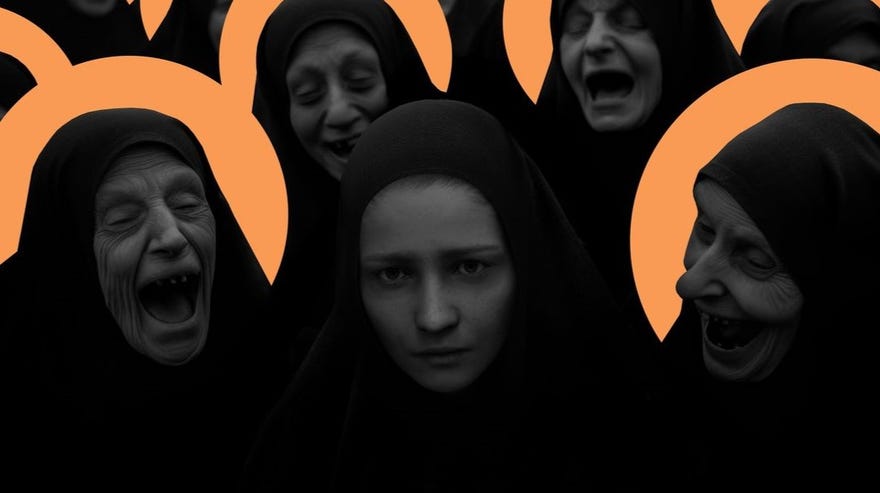How historical fantasy Indika channels its Russian creator's anger against Putin and the Orthodox Church
"What is happening in Russia now looks like some kind of crazy experiment."
It's rare that a developer explicitly introduces their game to you as "boring", and Indika seems anything but. Created by Odd Meter, the studio behind the well-received fantasy VR bow simulator Sacralith: The Archer's Tale, and published by Frostpunk developer 11 bit Studios, it's a "very serious adventure game" set in 19th century Russia, which casts you as a young Orthodox Christian nun on the run. Awash with doubts about her faith, and persecuted by a mysterious creature, the woman flees her nunnery and falls in with an escaped convict, who tells her of a mysterious "holy elder" who might ease her troubles, drawing on the power of a sacred artefact.
The game's setting is naturalistic, with motion-captured facial animations and photorealistic buildings and interiors, wrought using Unreal Engine. But it is also a "fairy tale" landscape, in the words of studio co-founder Dmitry Setlov, shot through with phantasmagorical flourishes - monochrome or blood-red filters and apparent hallucinations, to say nothing of the aforesaid creature, a skulking mass of tendrils that puts me in mind of the Shadow from Ursula K Le Guin's novel A Wizard Of Earthsea.
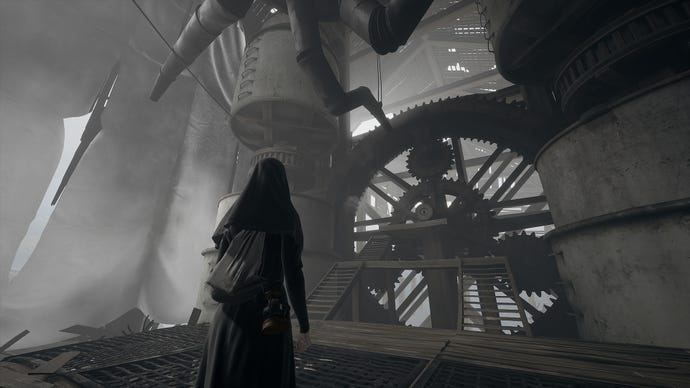
The game's locations are designed to feel a little too authentic - so obsessed with minutiae that they become unearthly. "Although we treat many historical details with great attention, many, on the contrary, are highly artistically processed, exaggerated, and brought to the point of grotesquery," says Setlov. The mechanics and rhythms of play, meanwhile, are very plot-driven and deliberately stifling. You can expect "a lot of cutscenes" and "tedious walkthroughs with long conversations", though Setlov adds that there will be "spatial puzzles that can brighten up this activity."
This oddly jubilant emphasis on stuffiness reflects Setlov's downbeat appraisal of canonical Russian literature. "If you read Dostoevsky, Tolstoy, Pasternak, you probably noticed that the stories often do not try to captivate the reader with an action-packed plot, prioritizing thoughtful, deep, sometimes verbose reflections," he says. "We also tried not to make mind-blowing action the basis of the player's experience. We tried to make the game more mature both in terms of the topics raised and in terms of presentation."
Indika's location design, meanwhile, calls upon the developers' background in architecture: Svetlov himself, Odd Meter's art director and the studio's chief concept artist are all graduates of the Moscow Architectural Institute, and worked in the field before entering game development. (If you're keen on architecture yourself, Odd Meter's Facebook page is a trove of historical trivia.)
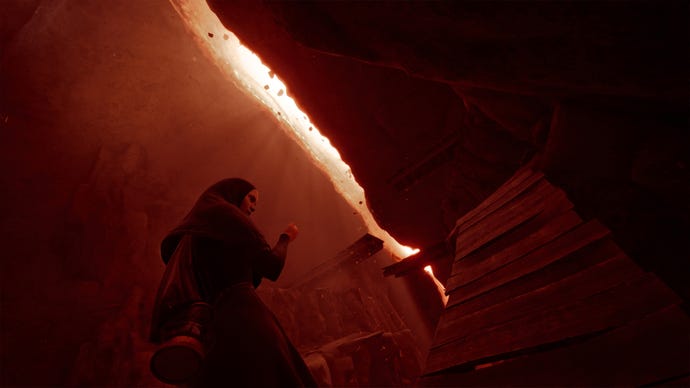
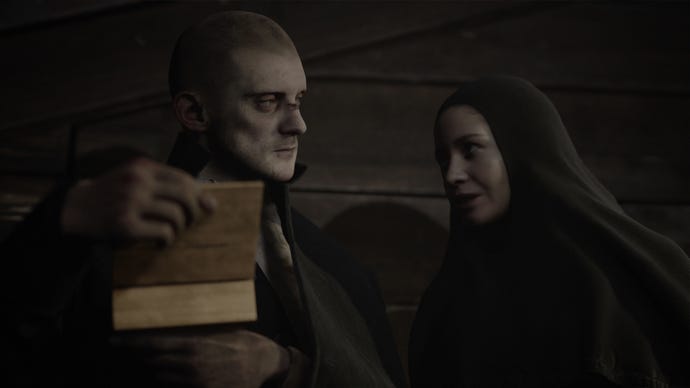
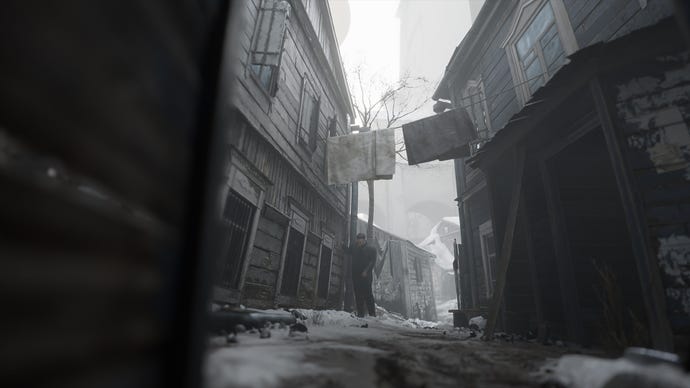
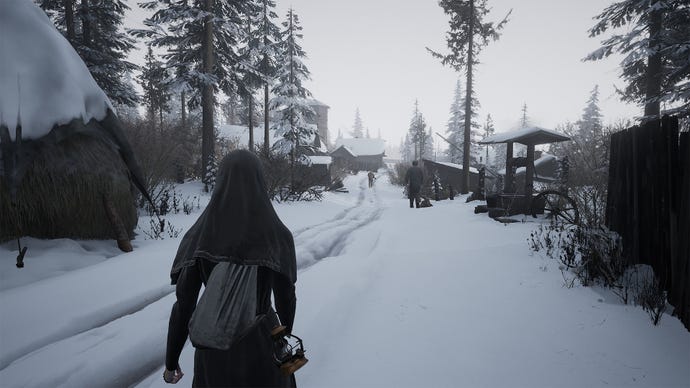
But if Indika's atmosphere of melancholy and perversity channels anything, it's Odd Meter's anger and grief for Russia under Vladimir Putin's regime. Once based in Moscow, the studio emigrated to neighbouring Kazakhstan during the opening months of the invasion of Ukraine in 2022, with some team members leaving individually while others moved as part of an organised relocation. Putin's mobilisation of recruits in September 2022 made it important to act swiftly to avoid being called up. Odd Meter team members have also fallen foul of the authorities while taking part in street protests against the government, but Setlov says the studio weren't seriously concerned about being mass-arrested.
"We decided to leave not because it became dangerous to stay, although several of our guys were detained at demonstrations," he goes on. "In fact, I don't think that we were seriously threatened by anything. We left because it was psychologically distressing to stay. We didn't agree with what was happening and we didn't want to feel like we were part of this madness." Svetlov describes walking around the capital of Kazakhstan, Astana, with the feeling that "a nail that had been sitting there for several months had been taken out of my head".
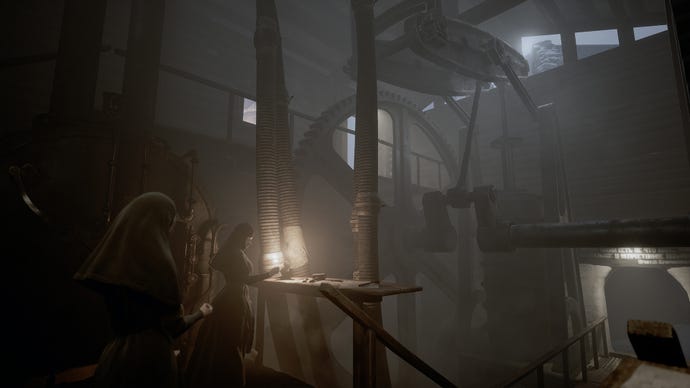
If the move to Kazakhstan has been a relief, Svetlov also feels an enormous sense of betrayal at feeling compelled to leave his country of birth. "I'm terribly angry," he says. "After all, I am one of those who dedicated my entire creative life to our culture, starting from the architectural institute and ending with Indika. And now people like me are called traitors, and they call themselves - who perceive our country exclusively as a source of insane enrichment - patriots." He continues to wrestle with a mixture of love for Russian culture and fear about being perceived as an apologist for Russia's current rulers. He also struggles with bitterness towards fellow Russians who, in his view, allow themselves to be duped by Putin's regime, or who are motivated by what he characterises as quasi-religious notions of fatalistic self-denial.
"If you believe not propaganda and official statistics, but your own eyes, then in my experience the government is supported by a minority," Svetlov says. "But to my surprise, a very large part simply 'buried their head in the sand'. Unhealthy resignation and patience seem to be endemic to our culture. And this is one of the themes of our game."
Indika's portrayal of religion and doubt draws upon Svetlov's own loss of faith, and his sense of how Putin's regime has worked hand in glove with the Russian Orthodox Church (if you want context, this article from The Conversation seems to offer a solid overview of Church-State relations in Russia). "I come from a very religious family," he continues. "As a child, I spent weekends in church, lived with my mother in a monastery, and so on. But at some point, I began to understand that religion achieves goals that are directly opposite to those stated.
"I see religion as the philosophy of war with its uncompromising nature, while I think peace is always a result of some compromise," he goes on. "It's no wonder that religion has now become one of Putin's propaganda weapons. So no, I'm not a believer. I would say [I'm] a militant non-believer." This rejection of the Church comes across in one of the 2020 announcement trailer's more farcical moments, when a tiny man clambers from an older nun's mouth and scurries down a cleric's arm to disrupt the ceremony of Holy Communion.
What can people outside Russia do to support opponents of Putin's government? Seemingly, very little. "Not many people are protesting in Russia now," Svetlov says. "At the beginning of the war, the opposition was completely destroyed, most politically active people left. What is happening in Russia now looks like some kind of crazy experiment. 100% of Russian media are now subordinate to the state and broadcast an absolutely parallel reality, in which Ukraine is a country of neo-Nazis who crucify children, and in Russia the vast majority supports the president." Support might need to come later, Svetlov adds, during the hoped-for period of recovery after the end of Putin's regime. "When it’s all over, it seems everyone will need long and difficult therapy."
Svetlov adds that propaganda doesn't necessarily have to present an appealing vision. It can prevail simply by presenting any kind of coherent alternative to a situation that is too awful to accept - an argument that, for me, rings just as true of political life in the increasingly unequal and demagogic UK, with its fading daydreams of imperial greatness. The nun's visceral reaction to the tiny, capering invader in the announcement trailer seems to capture this desire to be deluded, when times are hard. "It's enough to make the truth too scary and then you won't even have to deceive anyone," Svetlov goes on. "People themselves will happily believe in anything, just not to let the terrible truth into their heads."
